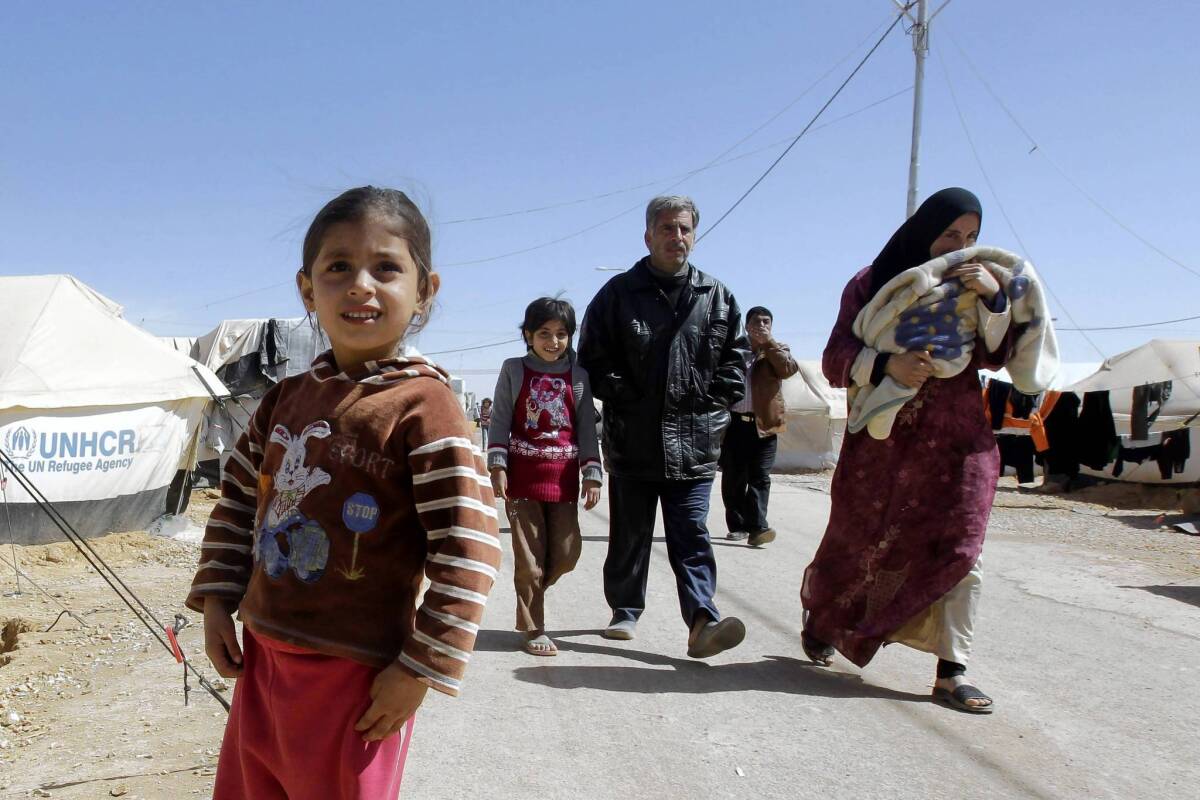Jordan feeling the strain of Syrian refugee influx

- Share via
JABIR, Jordan — The Jordanian officer slowly cut the rudimentary dressing that covered the boy’s left arm. Patches of red ooze seeped through the gauze. No one seemed to notice the boom of distant shelling.
A few hours earlier, the boy, 16, along with his brother and uncle, had made their way from their home in the embattled southern Syrian city of Dara to a rebel field hospital. From there, a driver took them to the border zone, where the Jordanian army picked them up.
“We were standing outside my uncle’s house, and a plane came and bombed the street,” the boy recounted, explaining how he and his brother, who was wounded in the leg, had become injured.
They were among the latest Syrian refugees to cross into Jordan, which is reeling beneath the weight of the escalating refugee crisis. Lebanon, Turkey and Iraq are under similar duress.
The financially strapped kingdom has repeatedly warned that it cannot handle the growing influx of people, now approaching 500,000, according to Jordanian government estimates. Many refugees arrive with physical wounds; others are psychologically traumatized. Most have few, if any, material possessions.
“Before, they would usually cross only at night,” said a Jordanian army captain at the Jabir border post. “Now they come at all hours of the day, by the hundreds.
“This week it’s slower than usual. … Maybe it’s because there is no one left over there,” he joked grimly.
Although the flow of refugees ebbs and swells, it never ceases, as the captain is well aware. Aid officials worry that Jordan could face a human deluge should an all-out battle break out for control of Damascus, less than 75 miles to the north and under periodic attack from rebels based in the Syrian capital’s outskirts.
Here at the border, newly arrived Syrians are taken to a nearby military base, given medical assistance, food, clothing and then sent on. Most are transferred to the Zaatari camp 50 miles northeast of Amman, the Jordanian capital.
Opened in July, Zaatari has become notorious among Syrian refugees for its harsh conditions. Initially created to shelter 50,000 refugees, the tent city is now home to about 108,000 — making it, in effect, Jordan’s fifth-largest town.
There is great reluctance to cram any more refugees into Zaatari, where rising tensions have already sparked riots and protests. There have been several fires that engulfed many tents, with one Syrian man reported killed.
This week Jordan set up a security cordon around the camp in an effort to curb rising crime and lawlessness among residents.
Yet plans to open new camps have stumbled amid a funding shortfall. The United Nations has received less than one-third of the $1.5 billion pledged by the international community.
In an isolated region off the highway leading to Saudi Arabia, one of the camps scheduled to open in coming weeks remains empty. The model facility — boasting beige Quonset huts interspersed among prefabricated buildings arrayed along white-pebbled streets — stands in stark contrast to the chaotic sprawl of Zaatari.
But experts caution that the state-of-the-art camp can be little more than a stopgap. The $7-million facility, funded by donations from Persian Gulf nations, is designed to house about 30,000 refugees; the United Nations estimates an average of 70,000 new refugees enter Jordan every month.
The scope of the escalating crisis becomes evident across the 500-yard no man’s land between Syria and Jordan. Jordanian soldiers wait on their side, watching as refugees pick their way around wrecked, abandoned bulldozers, destroyed pillboxes and razor wire. The area is part of the war zone, with rebels and Syrian military units engaging in running gun battles. Syrian forces are often accused of firing at fleeing refugees.
After making it across the zone and coming under the protection of the Jordanian military, the wounded 16-year-old and his brother were picked up by an ambulance from the nearby Ramtha hospital. The pair seemed numb in the wake of the terrifying bombing in Dara, but their escape brought no joy.
“We just got word that they buried my mother, barely 30 minutes ago,” the boy said.
Bulos is a special correspondent.
Times staff writer Patrick J. McDonnell in Beirut contributed to this report.
More to Read
Sign up for Essential California
The most important California stories and recommendations in your inbox every morning.
You may occasionally receive promotional content from the Los Angeles Times.











